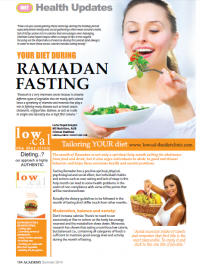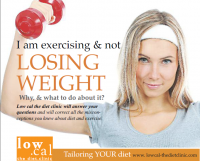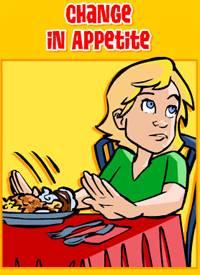Your questions and answers
PDF :
These are 10 of the most interesting questions I have been asked about nutrition and dieting.
“To fine tune those habits till the dieter reaches healthy change without suffering. All of this to reach a state where “ Dieting “ becomes a lifestyle not brackets that open/close leading to yoyo weight... hence loss of metabolism and eventually weight gain.”
1. What is the reason my friend eats greedily without gaining a gram & I constantly gain weight even if I feed on air?
Exactly, we are not all equal concerning weight gain, nor weight loss. Seems this difference is mostly due to genetic differences. More than 100 genes controlling weight gain/loss have been identified but their course of action not very well understood. For example: the genes ADRB2 & ADRB3 are associated with energy expenditure, so depending on the gene we have inherited our metabolism differ.
As for the gene PPAR gamma its associated with fat cell production, however in 2008 researchers found that the number of adipocytes ( fat stocking cells) are determined since childhood & adolescence & remain constant all our life span. Max Lafontan a French researcher specialized in obesity confirms this fact:” during weight loss regimens, only the size of the fat cells diminishes, their number remains constant. Therefore if we are born with a higher number of fat cells it would be much more difficult to lose weight AND to maintain this weight loss. Especially those complex mechanisms counter acting weight losses are stimulated by decrease in calories.
Other researchers have highlighted the influence of our bacterial flora on weight gain: certain bacterial flora may favor the absorption of nutrients in some people’s case not in the others. Statistically thinner people were demonstrated to have a stronger bacterial flora than overweight counterparts.
However we can’t put all the blame on our genes & our bacterial flora. This is to explain our differences facing weight loss/ gain regimens. In my opinion environmental factors such as socio-cultural & psychological are major determinants of our weight hence the necessity of a personalized dietetic professional follow up.
2. Is it possible to know our IDEAL BODY WEIGHT by calculation?
For years, body mass index (BMI) has been the most common way of measuring body fat. Calculated by multiplying weight (in pounds/Kgs) and then dividing by the person’s height (in inches/meters) squared, A BMI ranging between 18-25 is considered normal( i.e. for a 170 cm person, a normal weight is ranged between 54- 72 kgs) BMI 25- 30 is considered overweight. BMI > 30 is considered obese.
BMI has come under some scrutiny by medical professionals because it excludes factors such as body composition and muscle mass. As a result, a muscular person may incorrectly be considered obese by traditional calculation. On the other hand a person with low muscle mass & high fat mass might have a normal BMI still looking fat.
In the end, as nutritionists say, overweight is over fat in the body. So what matters is the amount of fat in the body that can be determined by classical method (fat caliper) or more advanced one (bioelectrical impedance). Also the localization of fat in the body is of
great importance too. Visceral fat located in the trunk (abdominal fat) being the most dangerous. In a study on 168000 persons, (in 2007), men with a waist higher than 107 cm ran 2.2 times more risks of developing cardiovascular problems & 3.4 times more risks of contracting diabetes compared with men having a waist < 84cm. As for women risks were multiplied by 2 & 6 respectively for a waist > 101 cm compared to their counterpart having a waist < 76cm.
3. Who are the people that shouldn’t undergo weight loss regimens?
These are mostly kids and adolescents; Studies showed that low calorie diets slowed growth and retarded puberty. Also pregnant women who underwent restrictive diets were at higher risk of miscarriages as well as slower baby growth.
4. Dieting leads to obesity?
In a study lead in 2001 at hotel-Dieu hospital In Paris, It was observed that people with the highest BMI were those who underwent the highest number of weight loss diets, who started it the earliest & who lost the highest number of kilograms! Irene Margaritis, nutrition professor, commented: “ we often see people who became obese after following a diet aiming to lose even less than 5 kilograms” She explains:” when we restrict calories we induce a disequilibrium, a deficiency in our nutritional & physiological needs add to it loss of metabolism accompanied with the loss of muscle mass “. Actually this decrease in the metabolic rate is what leads to weight gain; each 3 kgs of muscle mass loss leads tp a 60 cal decrease in the metabolic rate/day; if we count: that would give 9000Cal of energy over 150days, i.e. I kg of fat stored. and the more we follow those restrictive diets the lower the metabolism. (it might reach, in some cases, 800 Cal/day). Hence the importance of consulting a professional who’s task is: 1st to determine our target as to how much weight (FAT) we should lose. To determine the number of calories in a well balanced regimen in order to lose the excess fat. To instruct on how to follow this program constructed to the dieter in order to suit its nutritional needs. To tailor this diet according to his life style and habits. To fine tune those habits till the dieter reaches healthy change without suffering. All of this to reach a state where “ Dieting “ becomes a lifestyle not brackets that open/close leading to yoyo weight hence loss of metabolism and eventually weight gain.
5. Is it true that some food items, like pineapple, apples, draining drinks make you lose weight?
A research done in 2010 in the United States checking the truth about obese people losing weight (up to 7.9kgs) when they followed diet regimen based on one of the above food items. The analysis came that when obese people ate those food items they tend to replace more dense more calorific food with lower energy higher fiber higher volume nutrients. At the same time eating from those led to faster feeling of satiety. However persons with normal BMI didn’t have any significant weight loss when they followed any of the above regimens, since weight loss is really proportional to the amount of calories restricted within the regimen. As to nutritional supplements claiming weight loss, there is no scientific evidence backing up this claim.
6. You always tell us that breakfast is the most important meal of the day; does enlarging the breakfast meal help us lose weight?
Having the breakfast of a king is not always helpful within a weight loss regimen. In 2011, German researchers demonstrated that people didn’t dine less to compensate the extra calories taken over breakfast. On the contrary, they observed that when breakfast represented 120 Cal their total daily energy intake amounted to 1600 Cal vs. >2000 Cal/day when they took a breakfast of 600 Cal. On the other hand, studies showed that kids more particularly, suffered from obesity when they skipped this important meal.
7. Is weight loss a good criterion to measure the efficiency of a weight loss regimen?
All regimens lead to significant weight loss however as stated before some diets would lead to lots of nutritional deficiencies, also to loss of muscle mass hence a significant decrease in metabolism leading to regaining the weight lost moreover to putting on more weight as fat. A good weight loss regimen is a regimen that respects the person’s nutritional needs and equilibrium, which is personalized and followed up with a professional.
8. How efficient is the use of slimming massage creams?
In 2008, American dermatologist Dr Molly Wanner demonstrated a 1-2cm reduction in the mid-thigh circumference. Actually most of those creams contain caffeine favoring lipolysis and lymphatic drainage. Those creams are efficient within a complete package: healthy food habits, water intake, exercise, good sleeping.
9. It’s HOT.... Its Ice Cream time Do we really get addicted?
Over time, addicts build up a tolerance to drugs. Taking more doesn’t give them as much pleasure as their initial highs. One study showed the same may be true with ice cream. Scientists looked at one group of teens who regularly ate ice cream and another group who didn’t. The ice cream-eaters seemed to be de-sensitized to the milkshakes that is, the reward centers in their brains were less active than those of the group that ate ice cream less often.
How much calories?
A milkshake may be a tasty treat but you definitely shouldn’t have one often. One large shake at Baskin-Robbins has 1,070 calories and 32 grams of saturated fat, the equivalent of three Quarter Pounders, One scoop of premium ice cream has 250 to 350 calories and half a day’s saturated fat.
So I can eat diet ice cream as much as I want?
Light ice cream has at least 50% less fat or 33% fewer calories than regular ice cream, but that doesn’t make it necessarily healthier. And it doesn’t mean you should eat more of it. Chances are that even light ice cream has too much fat. Compare labels to help you choose the lower-fat option. And when you do have ice cream, just measure out a half a cup and eat it slowly for maximum enjoyment.
What causes brain freeze?
It’s a shame that something so pleasurable can cause such sharp pain. An ice cream headache (or "brain freeze") happens when something cold hits the warm roof of your mouth. This sets off nerves that control how much blood flows to your head; the nerves cause the blood vessels to swell up, triggering pain. You can try to prevent these headaches by eating cold food more slowly.
With or without the cone?
A sugar cone can have been 60 and 130 calories; a waffle cone canrange from 120 to 160 calories. If you get fancier and opt for say, a chocolate-dipped waffle cone at Ben and Jerry’s, the waffle cone alone will cost you 320 calories and 12 grams of saturated fat. The best bet? Save your calories for the ice cream itself and order your dessert in a cup. That’s calorie- and fat-free.
Did you know?
Ice and rock salt are the two things you will need to make the cream mixture cold enough to freeze. Because the rock salt lowers the freezing point of the ice, the temperature of the ice and rock salt mixture can go below the normal freezing point of water.
What is the difference between Sorbet & ice cream?
Sorbet, a tangy and fruity treat, is often served between courses to cleanse the palate. People who are lactose-intolerant can eat sorbet because sorbets are never made with dairy products. Sherbets can contain milk, eggs, or gelatin. Vegans – people who don’t eat any animal products -- can make ice cream with peanut butter, almond milk, coconut milk, and other dairy substitutes. Does frozen yoghurt contain the same active probiotic culture as regular yoghurt? Some frozen yogurts contain the beneficial "live and active" cultures found in a lot of yogurt. These cultures go dormant during freezing but become active again when eaten and returned to a warm temperature in the body. Look for the National Yogurt Association’s voluntary Live & Active Cultures seal, though. Not all frozen yogurts or yogurts for that matter contain live cultures.
Is it smarter to eat ½ cup of ice cream than to eat 1 full cup of sorbet or frozen yogurt?
One scoop of sorbet or soft-serve nonfat frozen yogurt has no saturated fat and about 120 calories. Compare that with half a scoop of the mint chocolate chip ice cream, which comes in at least 145 calories and 6 grams of saturated fat. You could have a full scoop of sorbet and still come out ahead. But don’t overeat; all of these contain a lot of sugar.
10. My Take away message:
Dietingshould not be a bracket in our life. We should adopt healthy eating habits & lifestyle to lose weight & most importantly to maintain this weight loss.
We shouldn’t rely on myths or magical food or creams to lose weight. When we want to lose weight we should plan reachable target within a logical time frame since losing lots of weight fast will engender losing big amount of muscle mass & metabolism. It only means regaining lost kilograms as fast as lost Even if a food item is labeled low fat or low calorie we shouldn’t abuse from it. (Always read nutritional label).
Last: make sure you eat proteins within each meal.
















